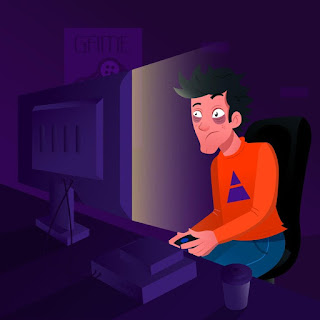WHAT IS IGD (INTERNET GAMING DISORDER)?
What is IGD (Internet Gaming Disorder)?
Internet Gaming Disorder (IGD) is recognized by the American Psychiatric Association (APA) in the DSM-5-TR (Diagnostic and Statistical Manual of Mental Disorders, 5th Edition, Text Revision) for further research. This disorder involves compulsive gaming, leading to significant disruptions in daily life. The DSM-5-TR includes substance-related addictive disorders like alcohol, tobacco, stimulants, marijuana, opioids etc. Gambling disorder is the only behavioral addiction identified in DSM-5-TR.
Criteria for IGD (need at least 5 out of 9 in a 12-month period):
Internet Gaming Disorder (IGD) is recognized by the American Psychiatric Association (APA) in the DSM-5-TR (Diagnostic and Statistical Manual of Mental Disorders, 5th Edition, Text Revision) for further research. This disorder involves compulsive gaming, leading to significant disruptions in daily life. The DSM-5-TR includes substance-related addictive disorders like alcohol, tobacco, stimulants, marijuana, opioids etc. Gambling disorder is the only behavioral addiction identified in DSM-5-TR.
Criteria for IGD (need at least 5 out of 9 in a 12-month period):
1. Preoccupation with games
2. Withdrawal symptoms when not gaming
3. Need to spend more time gaming
4. Failed attempts to control gaming
5. Loss of interest in other activities
6. Continued gaming despite problems
7. Deceiving others about gaming time
8. Using games to escape negative feelings
9. Risking or losing relationships and opportunities due to gaming
Symptoms include anxiety, muscle tension, irritability and sleep issues. The brain's response to gaming can be similar to drug addiction, affecting pleasure pathways.
Why is it in the news?
Recently, the Bombay High Court allowed a class 12 student to sit for an improvement exam, acknowledging that he suffered from Internet Gaming Disorder (IGD). He received treatment for anxiety and depression at Bhabha Atomic Research Center Hospital between July and December 2023, where he was diagnosed with IGD. This prevented him from taking the re-exam in July 2023.
Additionally, many recent incidents have highlighted the issue of children becoming addicted to mobile and online gaming, resulting in harm to themselves and others.
Why is it in the news?
Recently, the Bombay High Court allowed a class 12 student to sit for an improvement exam, acknowledging that he suffered from Internet Gaming Disorder (IGD). He received treatment for anxiety and depression at Bhabha Atomic Research Center Hospital between July and December 2023, where he was diagnosed with IGD. This prevented him from taking the re-exam in July 2023.
Additionally, many recent incidents have highlighted the issue of children becoming addicted to mobile and online gaming, resulting in harm to themselves and others.
A study published in the Indian Journal of Community Medicine and Public Health in 2020 found that about 3.5% of Indian adolescents suffer from Internet Gaming Disorder (IGD), a rate 0.5% higher than the global average. Since then, the prevalence of IGD has only increased. This growing trend raises serious concerns about the mental and physical health impacts of excessive gaming on children, underscoring the need for effective policies and execution to address this issue.
For this purpose, the Department of Consumer Affairs, in collaboration with NIMHANS (National Institute of Mental Health and Neurosciences), Bengaluru, is planning to research disruptive digital consumption behaviors. In a meeting, chaired by the secretary, the negative impacts of online gaming addiction were discussed, such as social isolation and financial strain. NIMHANS Director emphasized the need for collaboration and data analysis across different segments.
The research will guide consumers on optimal technology use and inform policy for protecting consumer interests and industry behavior.





Comments
Post a Comment